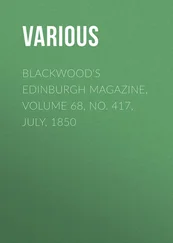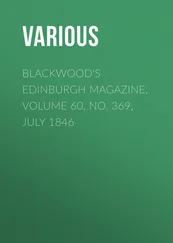Various - Blackwood's Edinburgh Magazine, Vol 58, No. 357, July 1845
Здесь есть возможность читать онлайн «Various - Blackwood's Edinburgh Magazine, Vol 58, No. 357, July 1845» — ознакомительный отрывок электронной книги совершенно бесплатно, а после прочтения отрывка купить полную версию. В некоторых случаях можно слушать аудио, скачать через торрент в формате fb2 и присутствует краткое содержание. Издательство: Иностранный паблик, Жанр: periodic, foreign_edu, Путешествия и география, на английском языке. Описание произведения, (предисловие) а так же отзывы посетителей доступны на портале библиотеки ЛибКат.
- Название:Blackwood's Edinburgh Magazine, Vol 58, No. 357, July 1845
- Автор:
- Издательство:Иностранный паблик
- Жанр:
- Год:неизвестен
- ISBN:нет данных
- Рейтинг книги:3 / 5. Голосов: 1
-
Избранное:Добавить в избранное
- Отзывы:
-
Ваша оценка:
- 60
- 1
- 2
- 3
- 4
- 5
Blackwood's Edinburgh Magazine, Vol 58, No. 357, July 1845: краткое содержание, описание и аннотация
Предлагаем к чтению аннотацию, описание, краткое содержание или предисловие (зависит от того, что написал сам автор книги «Blackwood's Edinburgh Magazine, Vol 58, No. 357, July 1845»). Если вы не нашли необходимую информацию о книге — напишите в комментариях, мы постараемся отыскать её.
Blackwood's Edinburgh Magazine, Vol 58, No. 357, July 1845 — читать онлайн ознакомительный отрывок
Ниже представлен текст книги, разбитый по страницам. Система сохранения места последней прочитанной страницы, позволяет с удобством читать онлайн бесплатно книгу «Blackwood's Edinburgh Magazine, Vol 58, No. 357, July 1845», без необходимости каждый раз заново искать на чём Вы остановились. Поставьте закладку, и сможете в любой момент перейти на страницу, на которой закончили чтение.
Интервал:
Закладка:
Various
Blackwood's Edinburgh Magazine, Vol 58, No. 357, July 1845
MARLBOROUGH. 1 1 Letters and Despatches of John Churchill, First Duke of Marlborough, from 1702 to 1712. Edited by Sir George Murray, G.C.B., Master-General of the Ordnance, &c. 3 vols. London, 1845.
No. I
Alexander the Great said, when he approached the tomb of Achilles, "Oh! fortunate youth, who had a Homer to be the herald of your fame!" "And well did he say so," says the Roman historian: "for, unless the Iliad had been written, the same earth which covered his body would have buried his name." Never was the truth of these words more clearly evinced than in the case of the Duke of Marlborough. Consummate as were the abilities, unbroken the success, immense the services of this great commander, he can scarcely be said to be known to the vast majority of his countrymen. They have heard the distant echo of his fame as they have that of the exploits of Timour, of Bajazet, and of Genghis Khan; the names of Blenheim and Ramillies, of Malplaquet and Oudenarde, awaken a transient feeling of exultation in their bosoms; but as to the particulars of these events, the difficulties with which their general had to struggle, the objects for which he contended, even the places where they occurred, they are, for the most part, as ignorant as they are of similar details in the campaigns of Baber or Aurengzebe. What they do know, is derived chiefly, if not entirely, from the histories of their enemies. Marlborough's exploits have made a prodigious impression on the Continent. The French, who felt the edge of his flaming sword, and saw the glories of the Grande Monarque torn from the long triumphant brow of Louis XIV.; the Dutch, who found in his conquering arm the stay of their sinking republic, and their salvation from slavery and persecution; the Germans, who saw the flames of the Palatinate avenged by his resistless power, and the ravages of war rolled back from the Rhine into the territory of the state which had provoked them; the Lutherans, who beheld in him the appointed instrument of divine vengeance, to punish the abominable perfidy and cruelty of the revocation of the edict of Nantes – have concurred in celebrating his exploits. The French nurses frightened their children with stories of "Marlbrook," as the Orientals say, when their horses start, they see the shadow of Richard Cœur-de-Lion crossing their path. Napoleon hummed the well-known air, "Marlbrook s'en va à la guerre," when he crossed the Niemen to commence the Moscow campaign. But in England, the country which he has made illustrious, the nation he has saved, the land of his birth, he is comparatively forgotten; and were it not for the popular pages of Voltaire, and the shadow which a great name throws over the stream of time in spite of every neglect, he would bevirtually unknown at this moment to nineteen-twentieths of the British people.
It is the fault of the national historians which has occasioned this singular injustice to one of the greatest of British heroes – certainly the most consummate, if we except Wellington, of British military commanders. No man has yet appeared who has done any thing like justice to the exploits of Marlborough. Smollett, whose unpretending narrative, compiled for the bookseller, has obtained a passing popularity by being the only existing sequel to Hume, had none of the qualities necessary to write a military history, or make the narrative of heroic exploits interesting. His talents for humour, as all the world knows, were great – for private adventure, or the delineation of common life in novels, considerable. But he had none of the higher qualities necessary to form a great historian; he had neither dramatic nor descriptive power; he was entirely destitute of philosophic views or power of general argument. In the delineation of individual character, he is often happy; his talents as a novelist, and as the narrator of private events, there appear to advantage. But he was neither a poet nor a painter, a statesman nor a philosopher. He neither saw whence the stream of events had come, nor whither it was going. We look in vain in his pages for the lucid arguments and rhetorical power with which Hume illustrated, and brought, as it were, under the mind's eye, the general arguments urged, or rather which might be urged by ability equal to his own, for and against every great change in British history. As little do we find the captivating colours with which Robertson has painted the discovery and wonders of America, or the luminous glance which he has thrown over the progress of society in the first volume of Charles V. Gibbon's incomparable powers of classification and description are wholly awanting. The fire of Napier's military pictures need not be looked for. What is usually complained of in Smollett, especially by his young readers, is, that he is so dull – the most fatal of all defects, and the most inexcusable in an historian. His heart was not in history, his hand was not trained to it; it is in "Roderick Random" or "Peregrine Pickle," not the continuation of Hume, that his powers are to be seen.
Lord Mahon has brought to the subject of the history of England from the treaty of Utrecht to that of Aix-la-Chapelle, talents of a kind much better adapted for doing justice to Marlborough's campaigns. He has remarkable power for individual narrative. His account of the gallant attempt, and subsequent hair-breadth escapes of the Pretender in 1745, is full of interest, and is justly praised by Sismondi as by far the best account extant of that romantic adventure. He possesses also a fair and equitable judgment, much discrimination, evident talent for drawing characters, and that upright and honourable heart, which is the first requisite for success in the delineation, as it is for success in the conduct of events. His industry in examining and collecting authorities is great; he is a scholar, a statesman, and a gentleman – no small requisites for the just delineation of noble and generous achievements. But notwithstanding all this, his work is not the one to rescue Marlborough's fame from the unworthy obscurity into which, in this country, it has fallen. He takes up the thread of events where Marlborough left them: he begins only at the peace of Utrecht. Besides this, he is not by nature a military historian, and if he had begun at the Revolution, the case would probably have been the same. Lord Mahon's attention has been mainly fixed on domestic story; it is in illustrating parliamentary contests or court intrigues, not military events, that his powers have been put forth. He has given a clear, judicious, and elegant narrative of British history, as regards these, so far as it is embraced by his accomplished pen; but the historian of Marlborough must treat him as second to none, not even to Louis XIV. or William III. Justice will never be done to the hero of the English revolution, till his Life is the subject of a separate work in every schoolboy's hands. We must have a memoir of him to be the companion of Southey's Life of Nelson, and Napier's Peninsular War.
Voltaire, in his "Siècle de Louis XIV.," could not avoid giving a sketch of the exploits of the British hero; and his natural impartiality has led him, so far as it goes, to give a tolerably fair one. It need hardly be said, that coming from the pen of such a writer, it is lively, animated, and distinct. But Voltaire was not a military historian; he had none of the feelings or associations which constitute one. War, when he wrote, had been for above half a century, with a few brilliant exceptions, a losing game to the French. In the War of the Succession they had lost their ascendancy in continental Europe; in that of the Seven Years, nearly their whole colonial dominions. The hard-won glories of Fontenoy, the doubtful success of Laffelt, were a poor compensation for these disasters. It was the fashion of his day to decry war as the game of kings, or flowing from the ambition of priests; if superstition was abolished, and popular virtue let into government, one eternal reign of peace and justice would commence. With these writers the great object was, to carry the cabinets of kings by assault, and introduce philosophers into government through the antechambers of mistresses. Peter the Great was their hero, Catharine of Russia their divinity, for they placed philosophers at the head of affairs. It was not to be supposed that in France, the vanquished country, in such an age justice should be done to the English conqueror. Yet such were the talents of Voltaire, especially for making a subject popular, that it is on his work, such as it is, that the fame of Marlborough mainly rests, even in his own country.
Читать дальшеИнтервал:
Закладка:
Похожие книги на «Blackwood's Edinburgh Magazine, Vol 58, No. 357, July 1845»
Представляем Вашему вниманию похожие книги на «Blackwood's Edinburgh Magazine, Vol 58, No. 357, July 1845» списком для выбора. Мы отобрали схожую по названию и смыслу литературу в надежде предоставить читателям больше вариантов отыскать новые, интересные, ещё непрочитанные произведения.
Обсуждение, отзывы о книге «Blackwood's Edinburgh Magazine, Vol 58, No. 357, July 1845» и просто собственные мнения читателей. Оставьте ваши комментарии, напишите, что Вы думаете о произведении, его смысле или главных героях. Укажите что конкретно понравилось, а что нет, и почему Вы так считаете.












